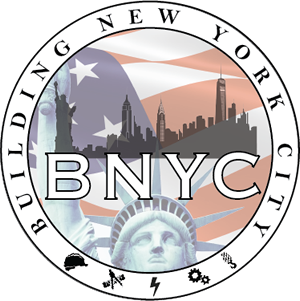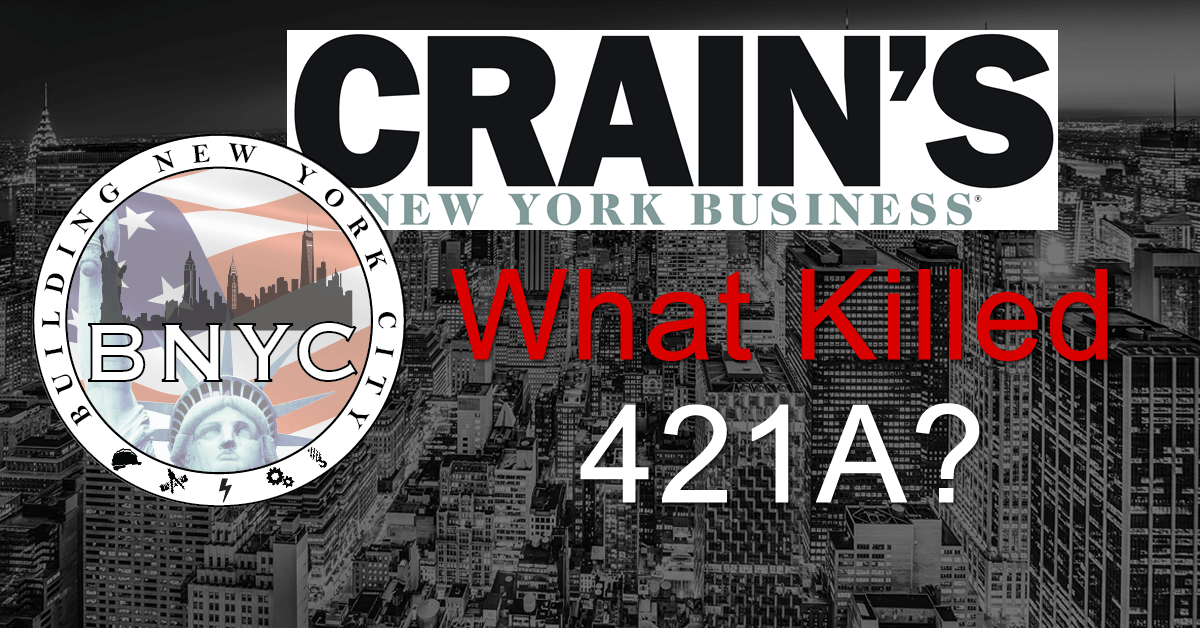From Crain’s New York Business:
Key program to produce affordable housing is losing out to myopic and selfish pleading by organized labor
By Brad Gerstman
The construction incentive program called 421-a was suffocated last month by a uniquely self-serving special interest. It could be revived by the state legislature, but for now, it no longer exists. For decades the program reduced building costs and encouraged affordable housing through tax abatements and other incentives.
The program is not without its critics. Some feel it doesn’t produce enough affordable units. But it’s undeniably an important tool that promotes affordability, as the New York State Association for Affordable Housing has argued strenuously.
But that kind of program won’t be created as long as the Building and Construction Trades Council of Greater New York, and its president Gary LaBarbera, continue with their myopic and selfish pleading to restrict tax breaks exclusively to companies that are using his union workers.
LaBarbera, concerned that the legislature will push for a new abatement program that doesn’t have the kind of protectionism he supports, continues to double down. He’s willing to limit the amount of affordable housing that gets built in the city unless his workers are given special treatment.
“After careful consideration, we believe it is very clear that absent a prevailing wage requirement, the 421-a tax-abatement program should not be renewed under any circumstances,” he said a few days ago. “We need a new, comprehensive approach that builds needed affordable housing citywide, while also offering construction workers good middle-class wages and benefits.”
Essentially, the tax breaks in 421-a, which Mayor Bill de Blasio sought to strengthen so even more units could be built, have become hostage to special interests that are trying to preserve their expensive niche in an industry that has begun to bypass their old-fashioned protectionism.
The special-interest pleading is not restricted to this one statute. As its grip on construction slips away, the old guard of the special interests is frantically pushing for other measures that would also add to construction costs.
Last spring a measure was introduced in the City Council that would “require recipients of city financial assistance in connection with a city development project to ensure that all employees performing work on such project in their respective trades are paid no less than the prevailing wage in their respective trades.”
Last fall, in conjunction with an emotional and fundamentally dishonest rally for worker safety, another bill was proffered that would obligate all workers on buildings taller than 10 stories to go through state-approved apprenticeship programs. As it happens, such training is controlled by unions and unionized companies.
After stripping away all of the lachrymose ranting over worker fatalities, what is revealed is a desperate attempt at survival by those whose featherbedding methods and pay scales have become obsolescent—and a direct threat to the mayor’s goal of a vast increase in affordable housing, which the city desperately needs.
For too long the forces of protectionism have used the public sector to promote their own interests and make living in the city even more expensive. That is why more than a dozen merit-based contractors and their thousands of workers have come together to form Building NYC—to promote competition in construction, expansion of affordable housing, and, in particular, the stimulation of greater diversity in the construction workforce.
As our mission statement says: “Much of the NYC construction industry is under siege by forces that cling to old patterns of behavior. These forces seek to undermine tens of thousands of minority workers doing the majority of the building in NYC and employing the greatest number of New Yorkers, especially minorities, thereby creating a diverse workforce who for the first time has significant opportunity for stability and longevity.”
It is high time for all of our elected officials to get behind merit in the construction industry—to support legislation that promotes vigorous competition, safety oversight and diversity in the building labor force, not measures that protect the privileges of the few over the well being of the many.
The revival of 421-a should be based on these public-interest principles. It is incumbent upon our political leaders to see that it does.
Brad Gerstman is an attorney, lobbyist and communications specialist, and a spokesman for Building NYC.
Read more from Crain’s New York…


